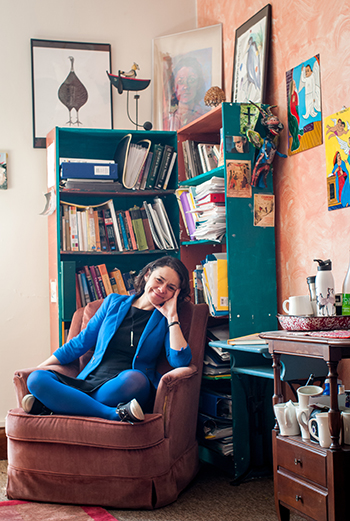
Colby-Sawyer Associate Professor of Humanities Ewa Chrusciel's New Book of Poetry Explores Borders Without Boundaries
NEW LONDON, N.H. — Colby-Sawyer College Associate Professor of Humanities Ewa Chrusciel's second book of poetry in English, Contraband of Hoopoe, will be released Oct. 1 by Omnidawn and distributed by University Press of New England.
The Polish-born poet will take part in An Evening with Local Authors at 7 p.m. on Oct. 1 at Tracy Memorial Library in New London.
The Local Arts Forum at Colby-Sawyer will feature Professor Chrusciel on Oct. 29 at 4 p.m. in the Archives Reading Room at the Susan Colgate Cleveland Library/Learning Center. The event is free and open to the public.
Contraband of Hoopoe, available at Morgan Hill Bookstore in New London and online retailers, is a series of braided poems and prose poems that interrogate the issues of dislocation, immigration and cross-cultural desire. Chrusciel invents a poetics of smuggling as she crosses national, historical and linguistic borders. The migratory narrative is haunted by a childhood lived under a Communist regime, by the austerity of Eastern Block politics, and by the possibility of discovering a fleeting language in whose very excesses are carried the seeds of illicit revelation, spiritual transformation and insight. The book also elevates smuggling to a noble activity, recording how the Jewish people were hidden and transported during the Holocaust.
One of the guiding totems of the book is the hoopoe, that bird of exile and return, which King Solomon sent to the Queen of Sheba to convert her to his faith. Under the aegis of this mythical bird, Chrusciel tracks a series of historical objects, undeclared beliefs and secret messages that immigrants throughout history have snuck through customs, past border checkpoints and across the seas. Contraband of Hoopoe tells a distinctly postmodern story, woven from the lives of countless immigrants past and present, through the contingencies of a poet who has migrated from Poland to the United States.
“The hoopoe is an orange bird with white and black stripes and a spectacular crest … He is the smuggler of sacred messages. By ceaseless cultural crossing, he is a peacemaker,” Professor Chrusciel said in an interview with Omnidawn's Rusty Morrison. “The hoopoe stands for the other, for the foreigner. It creates bewilderment. It transports us to new places. It changes us. That's the secret contraband of this book; well, one of them. Edith Stein suggests that the other puts us in motion, so we actively go out of ourselves to meet the other. My book embodies this desire—the desire to face the poverty of spirit, the wounded and the vulnerable in us and outside of us. And that desire tends to be disguised. The noblest contraband dwells in fraintendimento, understanding in-between or, in other words, reading between the lines.”
The collection received a starred review from Publisher's Weekly: Polish poet Chrusciel (Strata) opens her strange, mesmerizing fourth collection—her second in English—by asking: “Can you feel the apparition?” The book is less a collection of discrete poems than a flowing lyric study on sheltering oneself in the face of many faces of death. That flow is periodically interrupted by 14 poems titled “Ellis,” each of which describes objects, concepts, and people that were carried by immigrants on their journeys to new countries. In between, the mostly untitled poems all begin with an image that eventually unspools into a meditation on religion and oppression: a prayer candle becomes a metaphor for anti-Semitism; St. George's dragon becomes kudzu vines overtaking buildings and cities. At times Chrusciel's repetition becomes confusing, heightening a sense of déjà vu. Whole lines reappear in several places. The momentum that Chrusciel builds, however, wards off any tediousness and serves to make the experience of displacement feel familiar, as if one were dreaming, then woken, or maybe in a waking dream. Late in the book we are told that “[i]t is only the gravity of objects that keeps us from moving.” But movement seems holy, and in Chrusciel's hands, objects exert their own gravitational pull; each one a little world, hidden, secreted away, and sacred. (Oct.)
Professor Chrusciel has two books in Polish: Furkot (2003) and Sopilki (2009). Her first book in English, Strata, won the 2009 international book contest and was published with Emergency Press in 2011. Her poems have appeared in many books and magazines in Poland, England, Italy,and the United States, including Jubilat, Boston Review, Colorado Review, Lana Turner, Spoon River Review and Aufgabe. She has translated Jack London, Joseph Conrad, I.B. Singer and several contemporary American poets into Polish.


